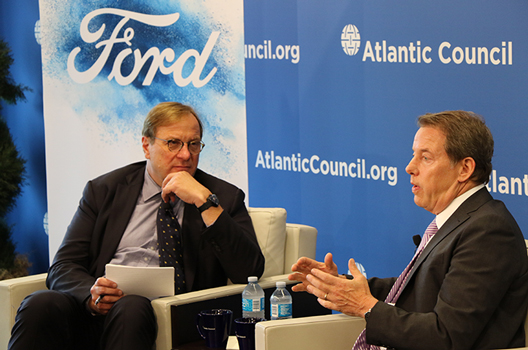 While Ford Motor Company is “disappointed” by US President Donald J. Trump’s decision to withdraw from the Paris Climate Accord, it will not impact the company’s strategy to continue working toward technological advances designed to improve customers’ quality of life, William C. Ford, Jr., executive chairman of Ford Motor Company, said at the Atlantic Council on June 5.
While Ford Motor Company is “disappointed” by US President Donald J. Trump’s decision to withdraw from the Paris Climate Accord, it will not impact the company’s strategy to continue working toward technological advances designed to improve customers’ quality of life, William C. Ford, Jr., executive chairman of Ford Motor Company, said at the Atlantic Council on June 5.
It “would be nice” to see the United States abide by the Paris deal, an international agreement with more than 190 countries committed to reducing their greenhouse-gas emissions, however, the US withdrawal from the accord “doesn’t change anything for us,” said Ford. He insisted his company, which has already made great progress toward clean energy improvements, will continue with business as usual.
“We are already ahead of where the Paris accords would like us to go,” in terms of environmental regulations, he said.
Ahead of Trump’s June 1 decision to pull the United States out of the Paris Climate Accord the president faced calls from leaders of US and international businesses—including Apple, Google, Facebook, Microsoft, and ExxonMobil—not to withdraw. Automaker Tesla Chief Executive Officer Elon Musk made good on his promise to quit Trump’s business advisory council in protest over the president’s decision.
The White House may have walked away from international cooperation on clean energy measures, but regulations and standards remain “vitally important,” said Ford. Looking ahead to a future of technological developments that have the potential to both improve and threaten human lives, Ford said that global partnership could facilitate their production and introduction to the market.
“It would make everyone’s life much easier if there were international standards,” he said, adding: “It makes life a lot clearer and allows us to move much faster.”
However, he cautioned, “there’s no point in moving fast if you don’t have a compass.” Not only for Ford Motor Company, but for all automotive and technology companies, there must be transparency, coordination, and ethical considerations of inevitable advancements, said Ford. He insisted that, “as we start to drive down this road to the future, we have to have a strong national sense of where we’re going.”
Ford joined Atlantic Council President and Chief Executive Officer Frederick Kempe to discuss Ford Motor Company’s role in the ethical development and implementation of emerging technology.
“Now we stand on the cusp of everything… being disrupted,” he said, warning: “If we’re not [ready], we’ll have some really serious societal impacts that none of us want to see.” However, according to Ford, his company has made great strides toward meeting these emerging challenges. “I truly believe we are on the cusp of changing what it’s like to live in cities for the better, and redefining what mobility means in rural areas as well.”
Without available mobility, people cannot deliver food and water, reach hospitals, or get to work. In these instances, according to Ford, mobility is a human rights issue. In the absence of these resources, quality of life can become dire. He said this is why his company focuses on developments which can improve people’s lives.
For example, he described how Ford Motor Company is working in a variety of sectors outside the auto industry with non-governmental organizations (NGOs) to improve capabilities such as information transportation, routing, and mapping to increase the capability of healthcare providers and aid workers.
“If you can give people back their most precious asset, which is time, that’s a pretty great thing,” said Ford.
However, Ford’s words came with a warning: “Technology is a great enabler, but you have to know what you’re enabling.” He claimed that new technology will impact not only the capabilities of industries, but the lives of all in society. “There’s a potential cost to this,” said Ford. For example, he said, autonomous cars will soon become a reality. Yet when that happens, what will happen to taxi drivers and truck drivers? Ford asked: “Are we, as a society, ready for that?” He said that working through the ethical ramifications of technological advancement is not a feat any one company can conquer alone. Rather, it will require cooperation on both national and international levels.
In order to safely and ethically regulate technological developments in the auto industry, “we should have standards,” said Ford. However, “we just need to have a place at the table when those are discussed.”
While the United States may have walked away from the table in Paris, there will be a greater role for individual companies and cities to meet the challenge set forth in the agreement. In this way, Ford said, “I feel like we [Ford Motor Company] do have a place at the table, internationally and domestically, when things affecting our future are being discussed.”
Rachel Ansley is an editorial assistant at the Atlantic Council.
Image: “Now we stand on the cusp of everything… being disrupted,” said William C. Ford, Jr. (right), executive chairman of Ford Motor Company. (Atlantic Council/Whitney Milam)
